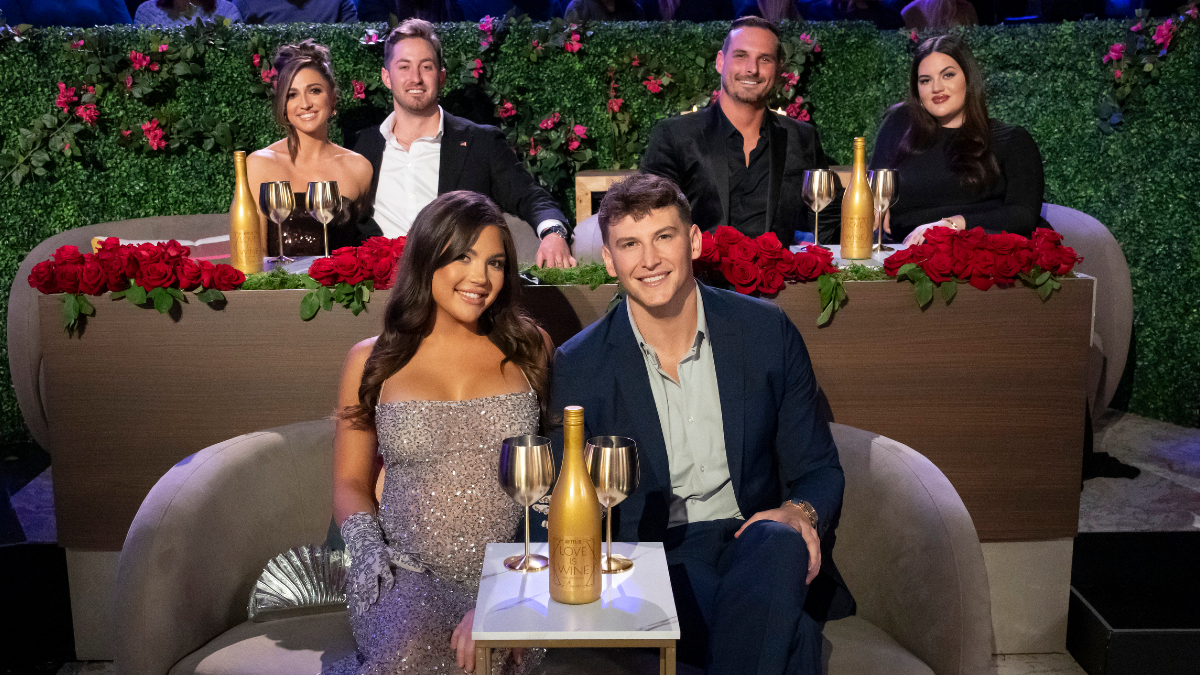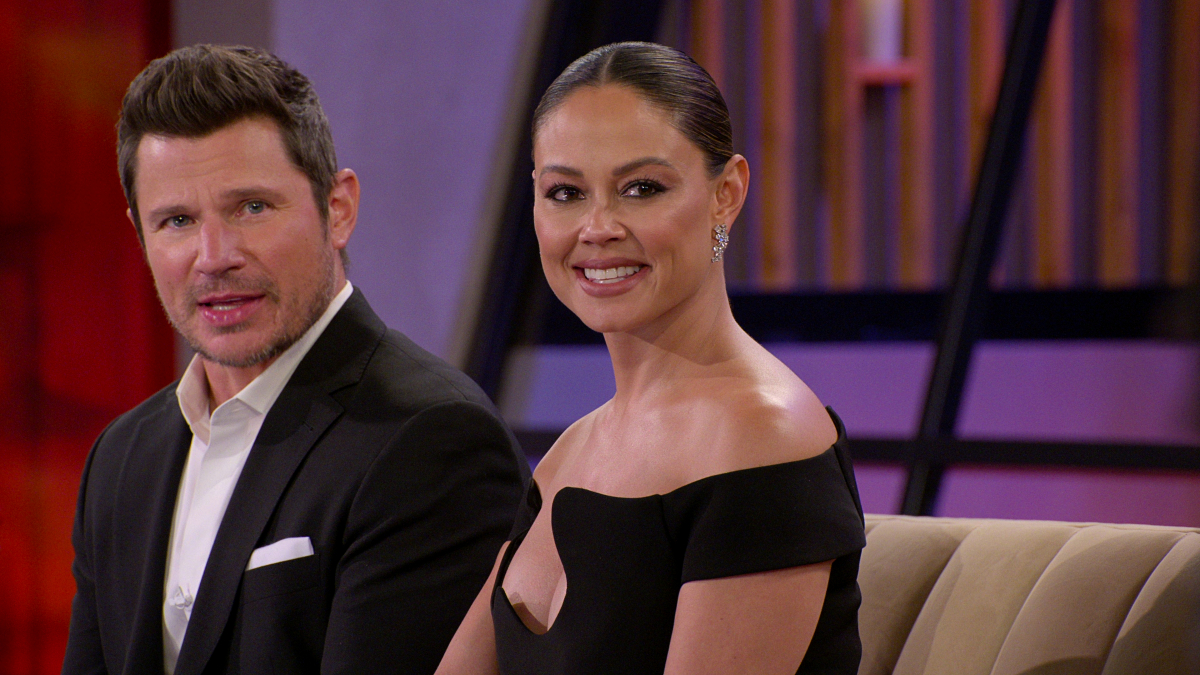There were plenty of awkward moments at the Love Is Blind season 6 reunion (Trevor’s silence was especially “uncomfy”), but what made the episode extra cringe-worthy had more to do with the production than the participants.
At one point during the Love Is Blind reunion, season 6 cast members Sarah Ann and Laura argue over Jeramey (can you imagine) and take turns accusing one another of being a “pick-me girl.” I desperately wanted someone on stage to interrupt and help these women come to their senses, not just because they were arguing about one of the least-deserving men of all time, but because the real pick-me girl in this situation isn’t Sarah Ann or Laura. It’s Love Is Blind itself.
With each season, the reunions are becoming more elaborate, the editing tricks more obvious, and the drama more exaggerated—often unnecessarily so. Take the “bean dip” situation, for instance. Jeramey didn’t really know what it meant when he approached AD and made a comment about bean dip, leading to an exchange that was awkward for everyone involved, but it was never clear why. Even after we were given some backstory, the drama didn’t really make sense. Laura encouraged Jeramey to say something about bean dip to AD, then feigned surprise when he followed through. It came up again twice during the reunion, for reasons less explicable than the joke itself. The bean dip situation is edited to look like a typical moment of reality TV drama, but unlike Trevor’s secret girlfriend or Matthew’s two-timing, it’s meaningless.
Netflix’s dating “experiment” was a novel addition to the streamer’s expanding reality lineup when it launched in 2020, just a month before COVID-19 sent most of America into isolation. 30 singles (15 men and 15 women) spend 10 days getting to know each other in specially built “pods” before choosing to get engaged sight unseen. The show follows the couples as they meet for the first time, move in with each other, and get ready for their wedding. Drama inevitably ensues. And because this is a reality show on a major platform, some participants are, in the parlance of the genre, there for the wrong reasons. Which always makes for good TV.
Six seasons in, Love Is Blind has become a huge hit, its popularity rivaling that of The Bachelor—the OG reality TV dating experiment in which a Bachelor or Bachelorette, typically chosen from the previous season’s contestants, spends several weeks narrowing down a pool of hopeful singles by going on dates rooted in heteronormative fantasies of romance (this is the draw for the series’ target demographic). The franchise, which has grown to include Bachelor in Paradise (the superior series) and The Golden Bachelor, follows a specific structure: several weeks of dating is followed by meeting potential in-laws, staying in fantasy suites (sex-optional hotel sleepovers), and a proposal that is usually filmed on some exotic beach. With over two decades on TV, The Bachelor franchise has developed its own vernacular, a dedicated fanbase known as Bachelor Nation, and a fraternity of former contestants who drop by for guest appearances or continue their journey to find love in Paradise.
What makes Love Is Blind so engaging to watch, aside from the basic premise (as it turns out, it’s easy to fall in love with someone sight unseen as long as you’re on a reality show where everyone is hot), is that it isn’t like The Bachelor. There’s a formula, obviously, of which heteronormative relationships between men and women are a key ingredient (along with bottomless wine bottles), but much of the drama occurs after the couples meet and spend a couple of weeks living together. Their fights and insecurities are recognizable to the average viewer, unlike The Bachelor, where contestants often engage in frivolous bickering to release pent-up frustrations.
On Love Is Blind, couples have intense conversations about finances, where they should live, how they live, and what their future should look like. Navigating another person’s desires, values, and insecurities can be a fraught process. While these are condensed courtships, the relationship conflicts are real, featuring the kinds of arguments that couples have all the time. We never see these conversations on The Bachelor (some former participants say that the more serious discussions usually happen during sleepovers), where contestants are so beholden to the language and unspoken rules of the franchise that it often sounds like they’re communicating in code.

Love Is Blind succeeds in a couple of key areas where The Bachelor notoriously struggles: the casting is more diverse and there’s a higher success rate. Unfortunately, during the season 6 reunion, it became glaringly obvious that Love Is Blind would love nothing more than to become Netflix’s version of The Bachelor. In addition to reconvening the participants from season 6, the reunion prominently featured previous cast members seated at cocktail tables adorned with red roses in front of the stage. Some of them were still coupled up, some were single, one is now working in the Love Is Blind casting department, and another—season 1’s Gigi—is in a relationship with a former Bachelor franchise cast member. As with the reunion participants, the previous cast members were glammed up like beauty pageant contestants with elaborate updos and sequined gowns. Co-hosts Nick and Vanessa Lachey introduced past participants as if they were members of a big family.
After fulfilling their basic job functions and interrogating this season’s biggest dramas—Trevor, Matthew, whatever happened between Jeramey and Sarah Ann—Nick and Vanessa finally revealed why the former cast members who aren’t in relationships were in attendance: they’re going to appear in season 2 of Perfect Match, a dating reality show featuring single cast members from other Netflix reality shows. Similar to Bachelor in Paradise, the show gamifies hooking up; the goal is to be partnered by the end of each episode, with new cast members arriving to disrupt established dynamics every week.
Netflix doesn’t need its own incestuous pool of reality TV quasi-celebs. Love Is Blind is successful precisely because it is nothing like The Bachelor—and arguably at its worst when it’s trying to replicate it.
(featured image: Netflix)










Published: Mar 14, 2024 04:41 pm